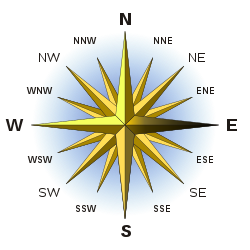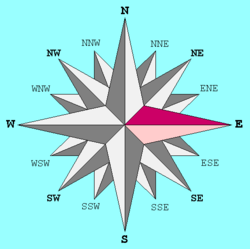
noun
- a cardinal point of the compass, 90° to the right of north. Abbreviation: E
- the direction in which this point lies.
- (usually initial capital letter) a quarter or territory situated in this direction.
- the East,
- the parts of Asia collectively lying east of Europe and including Asia Minor, Syria, Arabia, India, China, etc.; the Orient.
- the Far East.
- (formerly) the Soviet Union and its allies.
- the part of the U.S. east of the Mississippi River.
- the part of the U.S. east of the Allegheny Mountains.
- New England.
- Ancient and Medieval History.the Eastern Roman Empire.
adjective
- directed or proceeding toward the east.
- coming from the east: an east wind.
- lying toward or situated in the east: the east side.
- Ecclesiastical. being at the end of the church where the high altar is: an east window.
adverb
- to, toward, or in the east: an island located east of Sumatra; He went east.
noun
- one of the four cardinal points of the compass, 90° clockwise from north and 180° from west
- the direction along a parallel towards the sunrise, at 90° to north; the direction of the earth’s rotation
- the east (often capital) any area lying in or towards the eastRelated adjective: oriental
- cards (usually capital) the player or position at the table corresponding to east on the compass
adjective
- situated in, moving towards, or facing the east
- (esp of the wind) from the east
adverb
- in, to, or towards the east
- archaic (of the wind) from the east
noun the East
- the continent of Asia regarded as culturally distinct from Europe and the West; the Orient
- the countries under Communist rule and formerly under Communist rule, lying mainly in the E hemisphereCompare West (def. 2)
- (in the US)
- the area north of the Ohio and east of the Mississippi
- the area north of Maryland and east of the Alleghenies
adjective
-
- of or denoting the eastern part of a specified country, area, etc
- (as part of a name)East Sussex
Old English east “east, easterly, eastward,” from Proto-Germanic *aus-to-, *austra- “east, toward the sunrise” (cf. Old Frisian ast “east,” aster “eastward,” Dutch oost Old Saxon ost, Old High German ostan, German Ost, Old Norse austr “from the east”), from PIE *aus- “to shine,” especially “dawn” (cf. Sanskrit ushas “dawn;” Greek aurion “morning;” Old Irish usah, Lithuanian auszra “dawn;” Latin aurora “dawn,” auster “south”), literally “to shine.” The east is the direction in which dawn breaks. For theory of shift in sense in Latin, see Australia.
Meaning “the eastern part of the world” (from Europe) is from c.1300. French est, Spanish este are borrowings from Middle English, originally nautical. The east wind in Biblical Palestine was scorching and destructive (cf. Ezek. xvii:10); in New England it is bleak, wet, unhealthful.
Cold War use of East for “communist states” first recorded 1951. Natives of eastern Germany and the Baltics were known as easterlings 16c.-18c. East End of London so called by 1846; East Side of Manhattan so called from 1882; East Indies (India and Southeast Asia) so called 1590s to distinguish them from the West Indies.
 Liberal Dictionary English Dictionary
Liberal Dictionary English Dictionary




